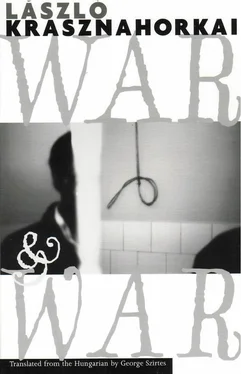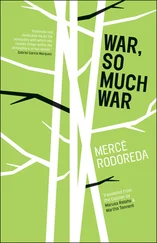Laszlo Krasznahorkai - War & War
Здесь есть возможность читать онлайн «Laszlo Krasznahorkai - War & War» весь текст электронной книги совершенно бесплатно (целиком полную версию без сокращений). В некоторых случаях можно слушать аудио, скачать через торрент в формате fb2 и присутствует краткое содержание. Год выпуска: 2006, ISBN: 2006, Издательство: New Directions, Жанр: Современная проза, на английском языке. Описание произведения, (предисловие) а так же отзывы посетителей доступны на портале библиотеки ЛибКат.
- Название:War & War
- Автор:
- Издательство:New Directions
- Жанр:
- Год:2006
- ISBN:978-0811216098
- Рейтинг книги:5 / 5. Голосов: 1
-
Избранное:Добавить в избранное
- Отзывы:
-
Ваша оценка:
- 100
- 1
- 2
- 3
- 4
- 5
War & War: краткое содержание, описание и аннотация
Предлагаем к чтению аннотацию, описание, краткое содержание или предисловие (зависит от того, что написал сам автор книги «War & War»). Если вы не нашли необходимую информацию о книге — напишите в комментариях, мы постараемся отыскать её.
War and War
War and War
War and War
War and War
War & War — читать онлайн бесплатно полную книгу (весь текст) целиком
Ниже представлен текст книги, разбитый по страницам. Система сохранения места последней прочитанной страницы, позволяет с удобством читать онлайн бесплатно книгу «War & War», без необходимости каждый раз заново искать на чём Вы остановились. Поставьте закладку, и сможете в любой момент перейти на страницу, на которой закончили чтение.
Интервал:
Закладка:
He read the enormous, ever longer sentences and typed them into the computer though his mind wasn’t on it but somewhere else altogether, he told the woman, so everything that remained of the last chapter of the manuscript practically typed itself and there was still a good deal left, for there remained all the stuff about the journey, the modes of transport, and about Marcus Cornelius Mastemann, who by way of farewell, had decided to call himself curatar vìarum —about the journey, in any case, about how the route needed to be constructed, and in the most painstaking explanations of what was a statumen , a rudus , the nucleus and pavimentum , the regulated dimensions of roads, the two obligatory ditches on either side of them and about the positioning of the crepinides and the milliarii, the rules regarding notices, then about the workings of the centuria accessarum velatorum , the famous brigade founded by Augustus for the maintenance of roads, and then the means of transport themselves, about the countless carriages and carts, the carpentum , the carruca , the raeda , the essedum , and all the rest including the birota , the petarritum , and the carrusa : vehicles on two wheels, the uncovered cisium and so forth until only Mastemann remained, or, more accurately, a description of the essential powers and responsibilities of any curatar vìarum, but all this, of course, contained in the central image of Bengazza, Falke and Toót standing by the shrine to Mercury, watching the Via Appia in case anyone appeared on it after all, and so, said Korin, he just kept writing, typing the last sentences into the computer while something completely different was going on in his mind, buzzing away continuously, shuddering, clattering, ticking away as he tried to sum up what it was he had seen in that great blinding light, for where did it all begin, he asked himself, but there, at the point when having left the records office, he took the manuscript home and read and reread it, time again, repeatedly asking himself what was the point of it, that it was all well and good, but what was it, and that this was the first question and the last too, holding within it the seeds of all the other questions, such as, for example, seeing the manuscript employed language what was the manner or pitch of it, what form of address was involved, for it was perfectly clear that it was not addressed to anyone in particular; and if it was not a letter, why it did not respond to the pressure of expectation demanded as a bare minimum by other works of literature; and what was it in any case if not a work of literature, for it was clearly not that; and why the writer employed a mass of amateurish devices while having not a scintilla of fear that he might sound amateurish, and besides that, why, in any case — Korin’s agitation was evident in his expression — does he describe four characters with such extraordinary clarity then insert them at certain historical moments, and why precisely one moment rather than another, why precisely these four and not some other people; and what is this fog, this miasma, out of which he leads them time after time; and what is the fog into which he then drives them; and why the constant repetition; and how does Kasser disappear at the end; and what is this perpetual, continuous secrecy about, and the ever more nagging impatience, increasing chapter on chapter, to discover who Mastemann is, and why each episode concerning him follows the same pattern, as does the narrative of the others too; and, most important of all, why does the writer go completely mad, whoever he is, whether he is a member of the Wlassich family or not, and how did his manuscript find its way into the Wlassich fasciculus if he was not, might it by some accident; in other words, said Korin still sitting on the bed and raising his voice, what, in the final analysis , does the manuscript hope to achieve, for there must be some reason for its coming into existence, some cause, Korin kept telling himself whenever he thought of it, some reason for its presence here; and then came the day, hard to say precisely when in retrospect, he couldn’t tell precisely now, three days ago or something like that, when suddenly there was light, and in that instant everything became clear, hard as it was to explain why then and not before, though he did think it was right, then, whenever it was, some three or so days ago, if only because he had thought about it for precisely the right length of time over the past few months, and because his thinking had taken precisely so much time to mature to a point at which it could at last become clear, and he himself most clearly remembered how, when he was having this experience, this blinding light and understanding thing, his whole heart was filled with a kind of warmth as he was unashamed now to say, if he might so put it, and furthermore it might have been better to begin with this, since it was very likely that this was how it began, and that the clarity could be traced back to this source, this warmth flooding through his heart, not that he wanted to get sentimental about it but that was how it happened, meaning that somebody, a certain Wlassich or other, had decided to invent four remarkable, pure, angelic men, and equip these four admirable, floating, infinitely refined beings with the most marvelous thoughts, and if one scanned through the story we are presented with, it seemed he was seeking a point from which he might lead them out of it, said Korin, indeed, he said, his hand trembling and his eyes glowing as if he had suddenly developed a fever, yes, he said, it was a way out that this Wlassich or whatever his name is, was seeking for them, but he could not find one that was wholly airy and fantastical so he sent them forth into the wholly real realm of history, into the reality of eternal war, and tried to settle them at a point that held the promise of peace, a promise that was never fulfilled, though he conjures this reality with ever more infernal power, with ever more devilish fidelity, ever greater demonic sensitivity, and populates it with the products of his own imagination, in vain as it turns out, for their path leads but from war to war, and never from war to peace, and this Wlassich, or whoever it is, despairs ever more of his one-person, amateurish ritual, and eventually goes completely off his head, for there is no Way Out, young lady, said Korin and bowed his head, and this conclusion must be agonizing beyond telling for the person who invented and had fallen in love with these four men — Bengazza, Falke, Toót and the ultimately vanishing Kasser — for they live so vividly in his own heart that he can hardly find the words to tell how he walks, walks up and down in his room with them, how he carries them out into the kitchen then back into his room, because something is driving him, and it is terrible to be so driven like this, young lady, said Korin to the woman, his eyes full of despair, for they have, as you might say, no Way Out, for there is only war and war everywhere, even within himself, and finally, and what’s more, now that it is finished and that the whole text is sitting there on his home page, he really doesn’t know what awaits him, for originally he had thought, and had made all his plans on that basis, that at the end he could set calmly out on his last journey, but now he must embark with this terrible helplessness in his heart, and he feels this is not the way it should be, that he should think of something, something at all costs, for he can’t carry them with him, but should put them down somewhere, but he can’t, his head can’t cope, he is too stupid, hollow, crazy, and it does nothing but ache, and is heavy and wants to drop off his neck, for there is nothing but pain and he can’t think of a damn thing.
Читать дальшеИнтервал:
Закладка:
Похожие книги на «War & War»
Представляем Вашему вниманию похожие книги на «War & War» списком для выбора. Мы отобрали схожую по названию и смыслу литературу в надежде предоставить читателям больше вариантов отыскать новые, интересные, ещё непрочитанные произведения.
Обсуждение, отзывы о книге «War & War» и просто собственные мнения читателей. Оставьте ваши комментарии, напишите, что Вы думаете о произведении, его смысле или главных героях. Укажите что конкретно понравилось, а что нет, и почему Вы так считаете.












